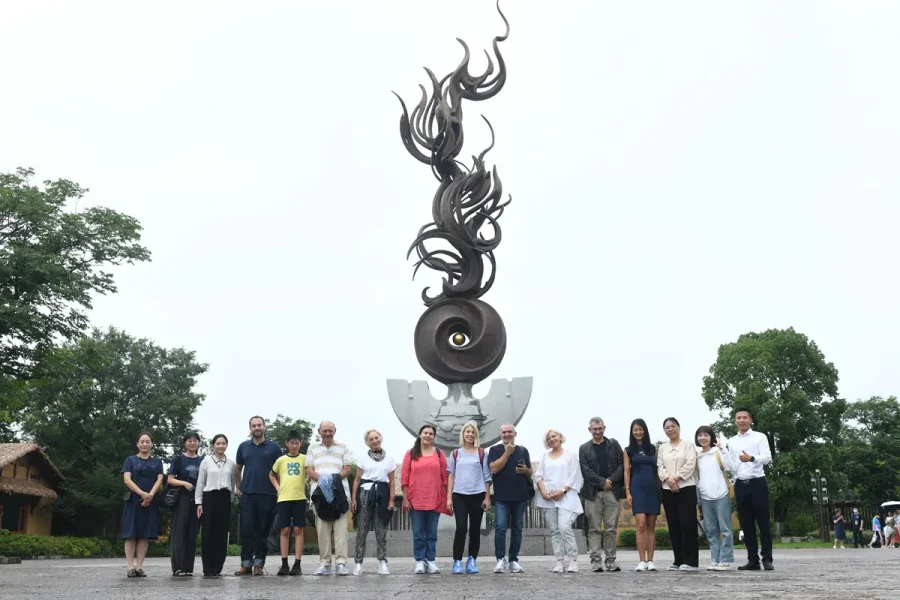March 15 marks the first anniversary of the Global Civilization Initiative (GCI), which was proposed by Chinese President Xi Jinping at the CPC in Dialogue with World Political Parties High-Level Meeting in 2023.
The initiative is another major public product provided to the world by China after the Global Development Initiative and the Global Security Initiative, both put forward by Xi in 2021 and 2022, respectively.
From the Liangzhu Forum held in East China’s Hangzhou to the Understanding China Conference held in South China’s Guangzhou, various means have been used to implement the GCI to respect the diversity of civilizations and tap into the profound significance of their histories and cultures in the contemporary world. This initiative stands as a robust response to concepts supporting the estrangement, clash, or superiority of civilizations.
Global Times reporters Chen Xi, XuLiuliu and Bi Mengying talked with British expert in international communication David William Ferguson and other scholars and experts who share their understanding of and experiences with the GCI over the past year.
In the office of David William Ferguson, honorary chief English editor of the Beijing-based Foreign Languages Press, the golden trophy he won at the Orchid Awards is prominently displayed on his desk.
The Orchid Awards, initiated by the China International Communications Group in 2022, are dedicated to celebrating individuals and organizations committed to enhancing cultural exchanges between China and the global community, while also promoting mutual learning among diverse civilizations.
In September 2023, Ferguson and other nine international figures were honored at the inaugural Orchid Awards ceremony. Ferguson was awarded for his “15 years of nonstop working in China and writing about China,” according to the event organizer.
“The award means a lot to me,” Ferguson said, noting that it serves as a platform to implement the Global Civilization Initiative and foster humanity’s shared values.
‘Modern context’ of traditional culture
As an expatriate living in China for almost two decades, Ferguson has witnessed the great changes of China by participating in some significant events as a journalist, including covering the 8-magnitude earthquake in Southwest China’s Sichuan Province in 2008, the Beijing 2008 Olympic Games and the Shanghai World Expo 2010, engaging in the revision and proofreading of many important Chinese -government white papers, as well as the English versions of some of Chinese President Xi Jinping’s works.
He told the Global Times that the proposal of the GCI is a modern expression of traditional Chinese culture and showcases the “continuity” in traditional Chinese culture as well as in China’s governance.
The GCI proposed by Xi says that countries need to uphold the principles of equality, mutual learning, dialogue and inclusiveness among civilizations, and let cultural exchanges to transcend estrangement, mutual learning to transcend clashes, and inclusiveness to transcend any sense of superiority.
Ferguson emphasized that the GCI is an important part of an ongoing process from the Belt and Road Initiative (BRI), through the global community of shared future, to the more recent Xi Jinping Thought on Culture.
In November 2023, Ferguson was invited to attend the Global Forum on Hehe Culture. At the time, he told the Global Times in an exclusive interview that the GCI inherited the wisdom of ancient Chinese while translating them, including the ideas of setting aside differences and embracing harmony from the Hehe culture, into a modern context.
The “continuity” represented by the GCI showcases one of the great strengths in China’s system – order and long-term stability. China is trying to realize its Second Centenary Goal, set by the CPC at its 18th National Congress, to model what China should look like in the future. This means Chinese leadership can look ahead and plan for the long term, which is different from Western developed states like the US and the UK where there is a constant change of leadership between two parties.
“A constant change of leadership between parties will lead to constant changes and priorities. It makes it very difficult to engage in long-term planning. And that is one of the great weaknesses of the Western democratic system which Western democrats fail to understand,” he said.
Wang Xuebin, a professor at the Party School of the CPC Central Committee (National Academy of Governance), echoed, saying the Global Civilization Initiative is a Chinese solution that Xi provided for the progress of human civilization through profoundly summarizing the wisdom and outstanding characteristics of Chinese civilization, while also answering the urgent demand for cultural exchanges in today’s world.
Wang explained that after sorting out the logic and connotative values proposed by the Global Development Initiative, the Global Security Initiative and the Global Civilization Initiative, it is not difficult to discover that security is the prerequisite for development, development is the driving force of security, and civilization is the soil for development and security. Meanwhile, development and security are the way to guide and promote civilization.










